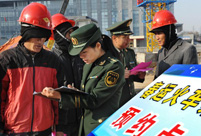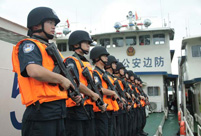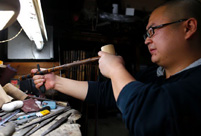 'Jin' named the word of the year by cross-strait netizens
'Jin' named the word of the year by cross-strait netizens Chinese scientific expedition goes to build new Antarctica station
Chinese scientific expedition goes to build new Antarctica station
 Chinese naval escort fleet conducts replenishment in Indian Ocean
Chinese naval escort fleet conducts replenishment in Indian Ocean 17th joint patrol of Mekong River to start
17th joint patrol of Mekong River to start China's moon rover, lander photograph each other
China's moon rover, lander photograph each other Teaming up against polluters
Teaming up against polluters
BEIJING, Dec. 21 -- With the Communist Party of China (CPC) clamping down on party corruption as part of its "mass line" campaign, some officials fear they will face hard times unless they get closer to the people.
One official in southwest China's Chongqing Municipality admitted he was talking too much and doing little, like "a shop owner leaving his business to employees."
Another official in the northern province of Hebei said he wrote and revised his self-criticism letters nearly 30 times, and "the more he reflected on his work, the more he sweated" as he realized his mistakes of not caring about people's well-being.
The officials were participating in "democratic life meetings," at which they were required to criticise themselves and their colleagues.
Such sessions, sometimes attended by top leaders, including Xi Jinping, general secretary of the CPC Central Committee, are part of the mass line campaign, a "thorough clean-up" of the party to rid it of "formalism, bureaucratism, hedonism and extravagance."
Almost 20,000 Chinese officials had been punished by the end of October for breaches of the anti-bureaucracy and waste guidelines announced by the central authorities late last year, according to a statement from the Central Commission for Discipline and Inspection of the CPC, the Party's anti-graft watchdog.
In the past 90-plus years, the CPC has grown from a revolutionary party of just over 50 members to an 80-million-strong political party ruling the world's most populous country.
However, the Party has been confronted with the increasingly grave dangers of incompetence, a lack of drive, corruption, being out of touch with the people, and other misconduct.
The campaign to promote the mass line, described as the "lifeline of the Party," was launched in June to broaden and cultivate contact with the masses amid growing public discontent over corruption. The campaign is supposed to continue until mid-2014.
During his July inspection tour to Xibaipo in Hebei Province, which served as a revolutionary base for the CPC between 1948 and 1949, Xi urged Party members to serve the people wholeheartedly to "ensure the color of red China will never change."
There used to be concerns that the "mass line" campaign could do little to shake up the party, and the campaign would become ritualized or a formality. However, the public and low-level officials are now seeing more clearly that the central leadership is determined to bolster the party's ties to the people through long-term efforts.
CHANGES
While eating and sleeping in local households, Zhou Benshun, secretary of the CPC Hebei Provincial Committee, and his colleagues were reminded of the days when they walked or rode bicycles to inspect villages and sat chatting with locals on long wooden benches.
In an effort to listen to people's voices and find their own shortcomings, Zhou and other local officials each stayed with locals for at least three days as a measure to fight slack work styles and obsession with superficial performance.
The provincial leaders also drafted 25 rectification measures, focusing on scientific and democratic decision-making and sticking to a clean-handed and people-oriented work style.
The central leadership has repeatedly urged efforts to ensure the results of the campaign can be seen and felt by the public and satisfy as many people as possible.
Dozens of teams of officials were dispatched by Party leadership to make sure that provincial leaders, university principals and the managers of state-owned enterprises seriously implement the campaign, reflect on their own practices and correct any misbehavior.
To implement the mass line, it is necessary to solve the problems that are most urgent and the people are worried about most, said Ma Tianrong, Party chief of north China's Changzhi City. "This year, we are putting priority on settling problems concerning education, employment, medical care and land use."
While promoting "soft" management of society, the campaign is removing with iron hands the privileges enjoyed by officials, which range from the use of government vehicles to lavish funerals.
The Political Bureau of the CPC Central Committee has issued a package of rules since December of last year requiring officials to refrain from excessive spending of public money on official vehicles, overseas trips, and receptions, which are the "three guzzlers" of public funds most likely to spark public outrage if used improperly.
A circular issued this week said CPC members and officials are strictly forbidden from hosting luxurious funerals or taking advantage of the occasion to collect condolence money from visitors.
Analysts said the new Chinese leadership is demonstrating its willingness to listen to public grievances and tackle deep-rooted problems that are getting in the way of the Party's development.
CATCH "TIGERS" AND "FLIES"
One of the main goals of the campaign is to root out corruption by locking up "tigers" and "flies," or high-ranking and low-level officials, as there have been recurring practices involving the trade of power by Party and government officials for personal benefit.
Authorities announced on Friday that Vice Minister of Public Security Li Dongsheng was under investigation for "suspected serious law and discipline violations."
It was the second time this year for a full member of the 18th Central Committee of the CPC to become the subject of a corruption investigation. Previously, Jiang Jiemin, head of a Cabinet commission that supervises major state-owned enterprises, was removed from office in September because of suspected serious disciplinary violations.
The CCDI has said it would target all senior officials as part of reforms to deepen its war on corruption.
More than a dozen senior officials have fallen due to corruption. The list includes Li Chuncheng, former deputy Party chief in Sichuan Province, and Wang Yongchun, former deputy general manager of the China National Petroleum Corporation.
Bo Xilai, former secretary of the Chongqing Municipal Committee of the CPC and former member of the Political Bureau of the Party's Central Committee, was sentenced to life imprisonment in September for bribery, embezzlement and abuse of power.
The CPC's stepped-up efforts in fighting corruption and removing undesirable work styles among officials have demonstrated the Party's resolution in exercising strict self-discipline, according to political analysts.
Ma Huaide, vice president of the China University of Political Science and Law, said corruption is essentially about power-for-money deals and the tunneling of benefits as China's market system has yet to be fully developed, leaving officials prone to corruption.
Curbing corruption effectively involves a system to control and supervise exercises of power, Ma said. "The supervisory roles may be played by civil groups, the market, and citizens."
Noting that China is still facing tasks in reforms, he said transforming government functions, delegating power to lower levels, and streamlining administration offer a "fundamental solution" for reducing corruption.
NO FORMALITY
In response to concerns that the "mass line" campaign would become ritualized, the central leadership has emphasized that the campaign must avoid going through the motions.
Xi has made it clear that he does not want mere words. He has said that the campaign would continue, and that officials "should not have the wrong idea that they have passed the test just because the sessions are over."
In order to prevent countermeasures against the central policy at the local level, the CPC has rolled out a set of detailed documents aimed at blocking all countermeasures to the campaign.
The latest move was a 26-item directive last week detailing regulations on how local authorities should spend public money when hosting visiting Party or government officials.
It lists 38 banned practices, providing detailed information on food, accommodation, transportation and tour arrangements.
Compared with previous regulations and bans on official receptions, which were only in general terms, such detailed regulations show the CPC's determination to stop the spread of corruption, said Fan Hesheng, vice director of the School of Sociology and Political Science of Anhui University.
Despite the achievements during the first phase of the campaign, which is nearing its end, experts and officials have called for more efforts to step up supervision and punishment in order to further improve officials' working style.
What the masses are concerned with most is whether the campaign will be further enhanced and implemented, said Wang Shiyi, an anti-corruption expert of the provincial party school in east China's Jiangsu Province.
Supervision from the public should play a bigger role in further promoting the campaign and building a clean government, he said.
The people should be encouraged to take the cause of the CPC seriously and be guided to exercise their supervision duties, he said.
 People prepare for upcoming 'Chunyun'
People prepare for upcoming 'Chunyun'  Highlights of Beijing int'l luxury show
Highlights of Beijing int'l luxury show Record of Chinese expressions in 2013
Record of Chinese expressions in 2013 China's moon rover, lander photograph each other
China's moon rover, lander photograph each other 17th joint patrol of Mekong River to start
17th joint patrol of Mekong River to start Spring City Kunming witnesses snowfall
Spring City Kunming witnesses snowfall Heritage of Jinghu, arts of strings
Heritage of Jinghu, arts of strings Weekly Sports Photos
Weekly Sports Photos PLA elite units unveiled
PLA elite units unveiled  China's stealth fighters hold drill over plateau
China's stealth fighters hold drill over plateau Chinese navy hospital ship's mission
Chinese navy hospital ship's mission  "Free lunch" program initiated in NW China
"Free lunch" program initiated in NW China  Rime scenery in Mount Huangshan
Rime scenery in Mount Huangshan DPRK's Kaesong Industrial Complex
DPRK's Kaesong Industrial Complex 'Jin' named the word of the year
'Jin' named the word of the year Day|Week|Month